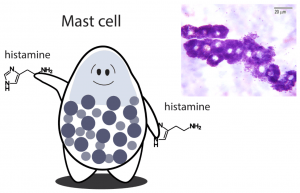 Worried About Histamine and Mast Cell Dysfunction?
Worried About Histamine and Mast Cell Dysfunction?
If you feel like your body is constantly battling new food allergies, rashes, hives, or mysterious aches and pains, you may have a histamine disorder. We all produce histamine as part of a healthy, active immune system.
When histamines do their job correctly, they act as chemical messengers released by mast cells, which then travel to areas assaulted by allergens (like your nose filled with pollen). They tell your body to protect that tissue. Sometimes they do their job a bit too well and you end up with horrible spring allergies or even a life-threatening peanut allergy.
In the case of mastocytosis or a mast cell activation disorder, you can experience numerous symptoms due to excess histamine throughout your body. This occurs when you have an abnormally high number of mast cells, or when your mast cells are over-producing histamine. Since there are so many possible symptoms, these not-so-rare conditions are often missed.
Some common symptoms of a mast cell disorder:
-Hives, itchy skin, flushing
-Angioedema (swelling of the face, lips, mouth)
-Muscle, bone or joint pain
-Fatigue, headache, dizziness, brain fog
-Cough, shortness of breath or wheezing, stuffy nose
-IBS-like symptoms, often with numerous food reactions
-Multiple chemical sensitivities
-Abnormal heart beat, blood pressure changes
No wonder this diagnosis gets missed!
If you and your doctor know what to look for, diagnosing a mast cell activation disorder is possible. Often simple blood tests are enough. The medications used to treat these conditions include mast cell stabilizers, such as cromolyn sodium or ketotifen.
Are there natural things that can help? Yes!
We recommend you always consult with your doctor before introducing a new treatment. Even if you have all the signs and symptoms, you may not actually have a mast cell activation disorder. It’s important to get a diagnosis first, and you don’t want to risk interfering with diagnostic labs.
If you do have one of these disorders, talk to your physician about:
-Food allergy and food intolerance testing
-Glutathione therapies
-Anti-inflammatory diet plans
– DAO enzyme supplements
-Quercetin and Vitamin C supplements
-Adrenal hormone support
-IV treatments like Medical Ozone and Vitamin C
It’s never too early to start a food diary and track when you experience any of your common health complaints after specific meals.
Yours in health,
Dr. Kaley Bourgeois
